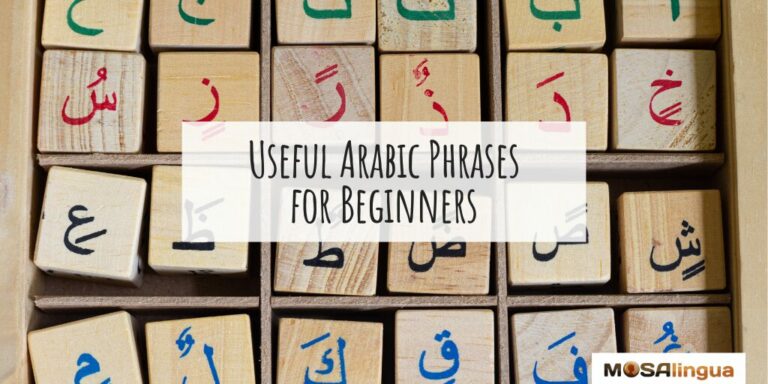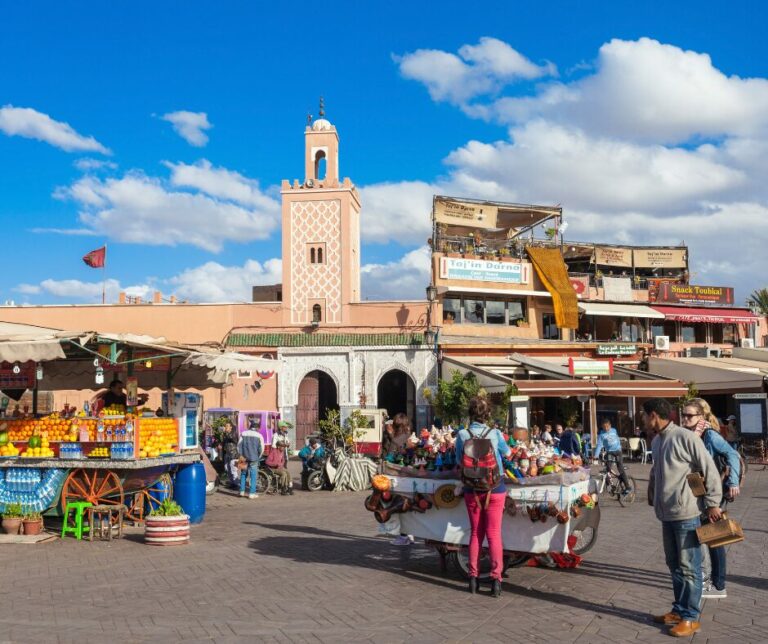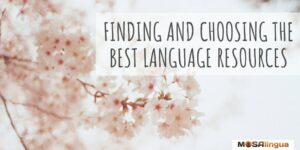Have you ever thought about relaxing on a Moroccan beach or exploring the mountains of Jordan? How about wandering through the lively markets of Cairo, or enjoying a luxurious resort in Dubai… But why just imagine it, when you can actually live it while speaking Arabic? Today, we’ll teach you 10 important and useful Arabic phrases that will help you start conversations and get the most out of encounters with Arabic speakers. So let’s begin this fun language adventure!

Most Useful Arabic Phrases for Beginners: Our Top 10
Learning these daily use phrases will help you feel a bit more comfortable speaking aloud in the language, and they will demonstrate kindness and curiosity. It’s always a good idea to be polite with native speakers when you’re traveling!
Hello, good morning
Ahlan, ṣabaaHu l-khayr (أَهْلاً, صَبَاحُ الْخَيْر)
Arabs are well known for their hospitality, so using phrases like “ahlan” (hello) and “ṣabaaHu l-khayr” (good morning) will reflect this welcoming spirit. Greeting a person in their native language is a great way to start a conversation off on the right foot!
Excuse me
‘Afwan (عَفْواً)
‘Afwan is the phrase you’ll use to get someone’s attention politely. It’s a gesture of respect, especially in crowded places or when interrupting someone.
Where is the… ?
‘Ayna…? (أَيْنَ)
In moments when you can’t locate your bus, your hotel, or even your passport, this Arabic phrase will be incredibly useful. Here are a few examples to ask for some local advice:
- أَيْنَ الْحَمَّام؟ (‘Ayna al-Hamaam?) = Where is the bathroom?
- أَيْنَ مَحَطَّة الحَافِلاَت؟ (‘Ayna maHaṭṭat al-Haafilaat?) = Where is the bus station?
- أَيْنَ المَطْعَم؟ (‘Ayna al-Maṭ3aam?) = Where is the restaurant?
But what if a person answers quickly or uses words that you don’t understand? Well, then you can say:
I don’t understand
Laa ‘afham (لاَ أَفْهَم)
If you’re having trouble understanding, this phrase can be really useful. Native Arabic speakers will always try to speak slowly and repeat as many times as needed until you get it. Generally speaking, people will appreciate the fact that you’re trying to learn and will be happy to help you.
“How do you say … in Arabic?”
Kayfa naquul … bi-l-3arabiyya? (يْفَ نَقُول … بِالْعَرَبِيَّة؟)
Use this sentence when you want to expand your Arabic vocabulary. It’s handy in situations where you forget a word you’ve learned or encounter one you haven’t heard before. Pretty useful, right? Arabs appreciate those who make an effort to learn their language, even if it’s just a few words. It can be a pleasant surprise for them!
I am…
‘Anaa… (أَنَا)
Introductions are important in every culture. And if you want to practice with native speakers, the first step is introducing yourself! In Arabic, we don’t need to use the verb “to be” in the present tense. So, to say “I am…” we simply say أَنَا (‘Anaa…) = “I…” and then add our name.
For example, “I am Radia.” = أَنَا رَاضِيَة (‘Anaa Radia.)
Simple, right?
Where are you from?
Min ‘ayna anta / anti? (مِنْ أَيْنَ أَنْتَ / أَنْتِ؟)
This is a common icebreaker question and can help you make friends quickly.
Arabs are genuinely interested in your background and they may use this question as a starting point for a conversation, and we do love to talk a lot!
Note that “anta” is the masculine form, and “anti” is the feminine form. You’ll need to adjust your question based on who you’re speaking with.
How much is it?
Bikam ath-thaman? (بِكَمْ الثَّمَن؟)
When you travel to exotic places, meet new people, and explore new cultures, you’ll probably want to take home some souvenirs from your adventures, right?
As you might have heard before, bargaining is a common practice in Arabic markets. Don’t hesitate to negotiate politely. Going to a public market or stall and talking with vendors is a great way to practice the phrases you’re learning, and to learn more about what you’re buying!
Thank you
Shukran (شُكْراً)
Gratitude is a universal language.
So after getting your tea with mint, the souvenir you wanted, or your vegetable tajin, you’ll want to say “thank you.” You’ll probably be using this sentence constantly, and you may hear it a lot as well!
Goodbye
Ma’a as-salama (مَعَ السَّلاَمَة)
Lastly, at the end of every conversation or transaction, there will be a time to say goodbye.
Before saying “Ma’a as-salama” to you, let me remind you that by using these phrases and greetings that you’ve just learned, you’ll be showing respect towards the language and culture of an Arabic-speaking country, and your efforts will certainly be appreciated by the people you’ll meet.
Make sure to continue your study of the Arabic language so you can build greater connections with others and communicate with ease when abroad.
WATCH: Most Useful Arabic Phrases for Beginners
Finally, be sure to watch our video on YouTube or below. You can hear Radia’s native pronunciation of each of the phrases mentioned above. The video is in English, but subtitles are available in several languages. Just click on the settings gear at the bottom right corner of the window.
Don’t forget to subscribe to our YouTube channel!
Go further
If you enjoyed this video and want to learn more about Arabic language and culture, you might also like:


![How to Say No in English Without Sounding Rude [VIDEO]](https://www.mosalingua.com/en/files/2022/06/How-to-Say-No-in-English-300x150.jpg)


Comments